Article's Content
“Do not fight them. Instead think of them the way you think of children, or pets, not important enough to affect your mental balance” ― Robert Greene, The 33 Strategies of War
GSuite is currently at war.
It’s at war with products in different verticals, targeting different buyers and solving different problems…all while still trying to gain market share & innovate. Solutions are launching every month trying to revolutionize the way people manage their calendar, their inbox, spreadsheets, create documents and conduct research. Every new solution that comes to the market is attempting (whether they know it or not) to put an additional ding in the armour of GSuite.
But GSuite rarely fights back…It doesn’t try to compete with superior products on pricing (ie. Zoom vs. Google Meet). It doesn’t try to keep its foot on the pedal for products embraced by the early adopters (RIP Google Inbox). Instead, it stays in its lane with an emphasis on serving existing customers and ignoring new products in the market, entirely. All while its’ parent company (Alphabet) prioritizes other verticals, products and revenue streams.
Where Does GSuite Fit Within Alphabet
It’s the year 2004.
Google, now known as Alphabet, decides to go public at a price of $54 per share.
Fast forward to 2020. The stock now sells for more than $1,400.
It’s a capitalist’s dream. Somewhere, between that $54 share price and today, there was the 2006 launch of Google Apps for Business, which in 2016 became GSuite.
How did we get there? Well, primarily…
On the back of advertising revenue, generated through its famous search engine Google & ads sold through YouTube. But the business behind Alphabet is far more complex than those two properties. Many of us know Alphabet (usually as Google) for their innovation in self-driving cars, an attempt at augmented reality glasses, smart speakers, the popular Android operating system and Chromebooks. Supporting and funding most of this innovation is ad revenue:
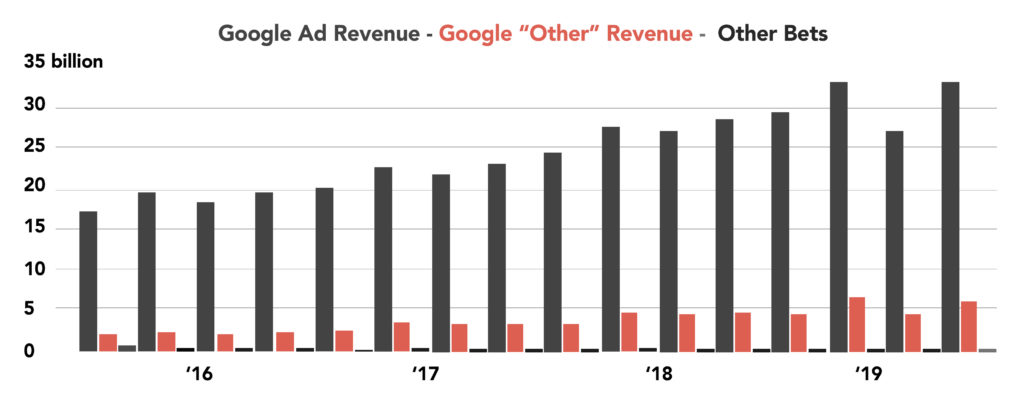

You see that small “other revenue” category hovering around $5-7B in revenue between 2019 and 2020? That’s the revenue coming from products like Nest, Chromebooks and the product we’re going to be focusing on today: GSuite.
GSuite was originally launched on August 28, 2006 as Google Apps for Your Domain. GSuite is a collection of cloud computing, productivity and collaboration tools that allow businesses to run most of their cloud operations. GSuite consists of Gmail, Hangouts Meet, Calendar, Drive, Docs, Sheets, Slides, Keep, Forms, Sites and, depending on the plan, an Admin panel and Vault for managing users and the services.
While you can access Gmail, Calendar, Drive, Hangouts, Sheets, etc all for free with a generic Gmail account, GSuite provides you with a custom domain and an experience that can be shared amongst multiple people within an organization. It’s used by everything from freelancers to businesses with thousands of employees.
It took just under 10 years for GSuite (Google Apps for Business) to go from launch to having 2 million businesses signed up and paying for GSuite. In 2017, the product reached 3 million and in 2018, it rose to 4 million. In February 2019, David Thacker, the Vice President of Product and Design announced that more than 5 million paying businesses were using GSuite.
It’s impressive.
The growth of GSuite has been consistently up and to the right, adding a million new businesses each year since 2017. As we look into the future, the expectation is that GSuite will continue up and to the right, with a slight reduction in momentum.
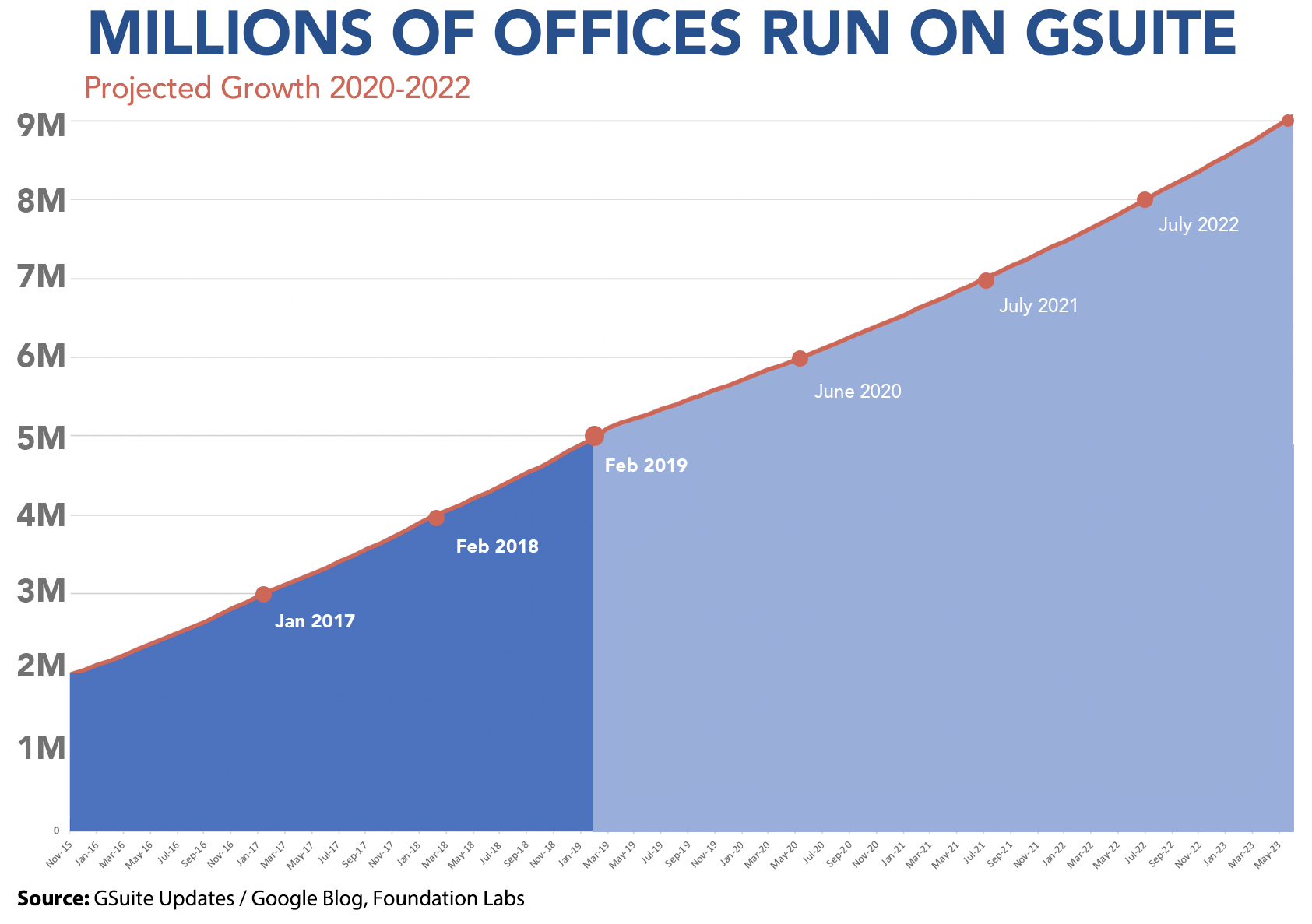

In their 2019 Q4 & full year financial results – Alphabet announced $2.6 billion for all cloud revenue, which includes GSuite and Google’s cloud infrastructure revenue. They are up more than 50%, from $1.7 billion, in revenue from the year before:
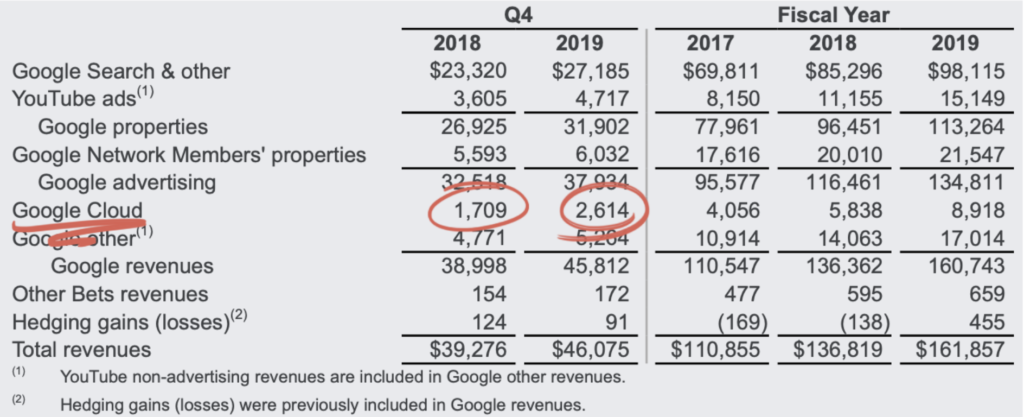

There’s no clean way to accurately estimate what percentage of the “Google Cloud” revenue belongs to GSuite and what belongs to the Google Cloud Platform. Yet, it is safe to assume that the GSuite alone would be a member of the $100M ARR SaaS club. That’s the celebrated group of SaaS startups that have scaled, consistently won and are well on track for an IPO.
But this is also wherein lies an opportunity.
Why GSuite’s Lack Of Attention Offers Opportunity
Bruce Lee once said:
“The successful warrior is the average man with laser-like focus.”
Focus is often a competitive advantage. Focus is one thing that many of the most successful people in the world will suggest had a lot to do with their ability to win. For startups, the opportunity to chase new features, new industries, new markets and embrace new models can feel endless. Paul Graham, cofounder of Y Combinator, which has invested in billion dollar startups like Dropbox, Airbnb, and Stripe, put it like this:
The most important thing for startups to do is to focus, because there are so many things you could be doing. One of them is the most important. You should be doing that. And not any of the others.
When you look at Alphabet as a whole — its’ focus is on a lot of things and GSuite and the various products within it are far from the top of that list. As long as GSuite is bunched into a grouping with “Google Cloud” and is generating less revenue than Google Advertising, YouTube Ads, etc… it’s not going to get the attention it requires to reach its full product potential.
How Zoom Capitalized On The Lack Of Focus
“Do not engage an enemy more powerful than you. And if it is unavoidable and you do have to engage, then make sure you engage it on your terms, not on your enemy’s terms.” – Sun Tzu
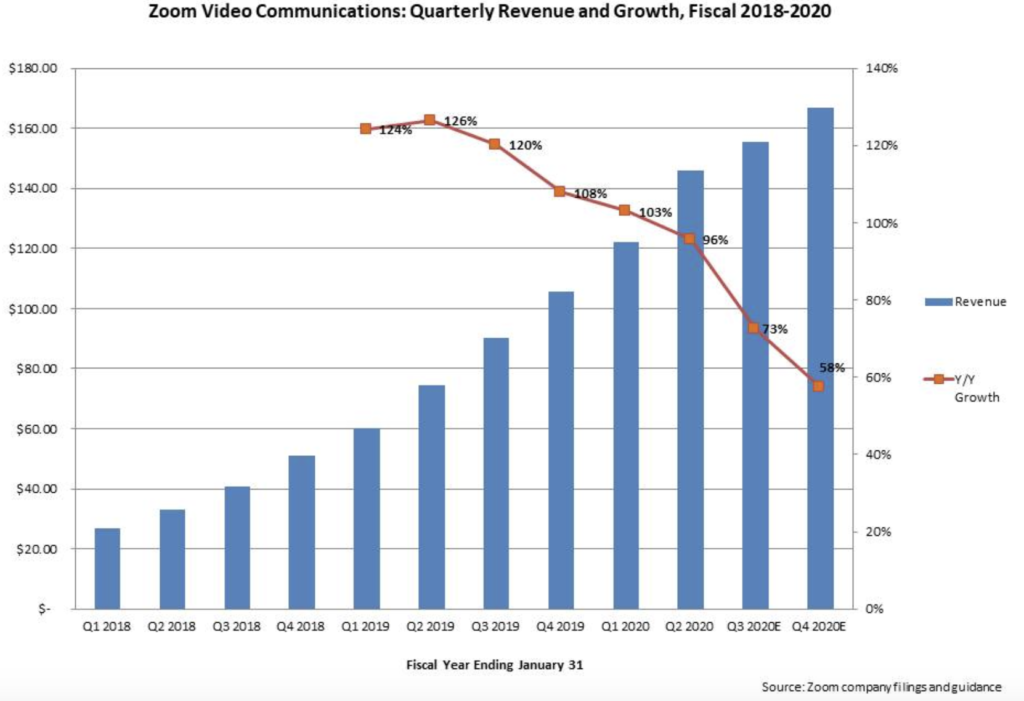

This reality became clear in 2019 when Zoom went public, showing $330 million in revenue in the year ending January 31, 2019 with a gross profit of $269.5 million. Zoom has more than doubled its revenues from 2017 to 2018, ending 2017 with $60.8 million in revenue and 2018 with $151.5 million. Keep in mind… Zoom doesn’t compete with Google Docs, Google Slides, Google Keep or Gmail…
It’s just competing with Google Hangouts / Meet.
Zoom is going after just one of the products found within the GSuite and is forecasting $610M in annual revenue this year. GSuite and Google Cloud combined for $1.7 billion… Zoom as a product within GSuite would represent 35% of all Google Cloud / GSuite revenue. Sure… Zoom has had a head start at this market launching in 2011, while Hangouts launched in 2013, but the fact remains that Google had more firepower to put behind Google Hangout than Zoom. Yet, Google is still not winning the battle, which shows that Focus really is key.
And that’s what lies one of the biggest opportunities in SaaS.
The Unbundling Of GSuite
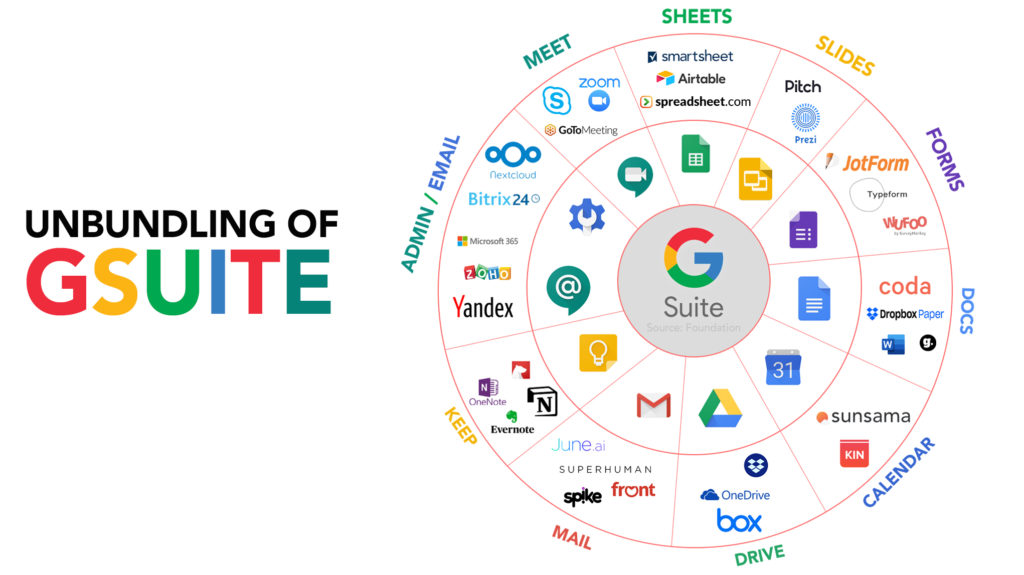

The Unbundling of GSuite is an evolution of the more than 10 year old idea surrounding the Unbundling of Craigslist. The Unbundling of Craigslist resulted in a plethora of marketplace startups (now large companies) such as Airbnb, Stubhub, Redfin, Etsy and Indeed. It’s my belief that the Unbundling of GSuite is an opportunity in SaaS that will result in more success than it already has. Some organizations have already capitalized on this opportunity such as Zoom, Smartsheet, Evernote, Zoho and Dropbox. I expect that many other new entrants, such as Superhuman, Spreadsheet, Spike, Airtable, Notion and Coda, will all have the chance to thrive as they take advantage of the blueprint shared by GSuite.
Some of you might be thinking:
This is also like the unbundling of Microsoft Office… 100%.
But Microsoft is the leader when it comes to documents, spreadsheets, presentations and email. The products required to run your Office is a primary focus for Microsoft. Alphabet is focused on advertising revenue while Microsoft is focused on their Cloud Service (Azure) AND Office 360.
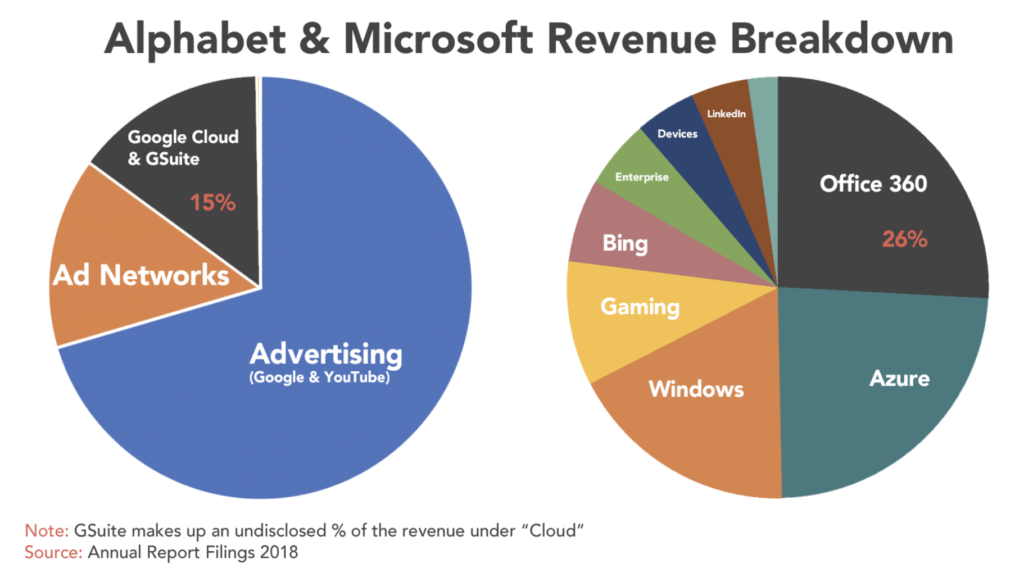

Today, Microsoft has the largest commercial cloud business in the world, surpassing $38 billion in revenue in 2019. To put that in perspective, that’s about 4x the size of Google Cloud. I use GSuite as the comparison because GSuite was built with the cloud in mind. Microsoft Office was built as software, then evolved into the cloud, and has dominated ever since.
This isn’t to suggest that Microsoft doesn’t have vulnerability. The unbundling of Excel has already started and is offering new opportunities for SaaS brands to unlock opportunities for different use-cases and within different industries.
Wrapping It Up
Since its inception, GSuite’s growth has been impressive, yet their lack of focus on the product is what is going to allow other competitors to rise to the occasion and beat them at their own game.
We’ve already seen Zoom stepping it up and taking over the Google Hangouts/Meet space, and being hugely successful in their laser-like focus for this one product. If Alphabet wants to continue to see growth in their GSuite product, they need to start paying attention to the competition and focusing on ways to stand out…otherwise, they’ll be another company that allows their product to get swallowed up piece by piece.
So, what’s next? We’ll have to keep a pulse on the new entrants, to see how they will stand out from the GSuite offerings and if they will be able to focus-in on their unique products. Let us know, in the comments, what you use!
Do you use GSuite, other products or a mix of both? What are you excited to see in the future? And what do you think GSuite needs to do to stand out from the crowd?








